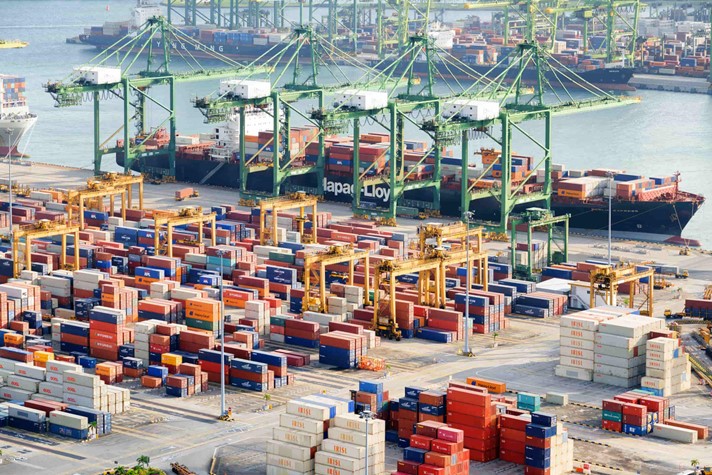
Staying afloat on mountains of paperwork is one of the biggest struggles for logistics companies, especially those that use outdated processes. Below, we explore the benefits of automation in logistics and transportation and how automated document management solutions enable efficient workflows for precise record-keeping, tracking, and shipping of goods.
Read on to discover how OCR data capture solutions like Xtracta can mitigate or prevent costly errors and increase efficiency for your logistics document management software.
What is Document Management in Logistics?
Document management software in logistics and transportation allows companies to efficiently manage document flows in their supply chain. All information must be readily available within a unified system for effective document management. Outdated or manual processing systems increase the risk of lost or poor-quality data.
While the logistics industry still relies heavily on paper documents, more and more companies are shifting toward automated document management solutions to stay afloat and relevant within the 21st century.
Companies that transport internationally must also contend with challenges and barriers, such as congestion, damaged cargo, customs backlogs, and harsh weather conditions.
With these challenges to face already, companies need to reduce the chance of other unforeseen complications cropping up. When shipping across borders, all documents must contain accurate information and meet customs requirements. While pre- and post-transportation management can help, to err is human; even minor mistakes or misreads can impede an entire shipment, causing additional delays and unforeseen costs to accrue. Automating document management helps companies prevent further complications caused by poor document management.
Logistic Document Types
Documents are an essential part of all logistics processes. Most shipping documents are mandatory, but some depend on the cargo type or shipping location or destination. Key logistics shipping documents for international delivery include:
- Invoices
- Bills of lading
- Shipping slips
- Customs documents
- Packing lists
Logistics documents often go through many hands, from supplier to receiver to end customer. In the form of paper documents, these documents can be difficult to process, slowing down the movement of goods and impacting the supply chain. Converting paper documents into electronic format helps companies accurately process and safely store vital information in efficient timeframes.
The Unreliability of Paper Documents in Logistics
Logistics is an industry that relies heavily on paper documents. From the management and tracking of inventory in warehouses to the movement of goods from distribution centres to overseas stores, keeping a paper trail for every single logistics process is essential. Paper trails help companies ensure that everything is tracked and accounted for. However, lost or damaged physical documents can cause costly difficulties. A single movement can include hundreds of tracked documents, and errors within documents can make tracking very difficult, potentially causing delays or shipment cancellations.
The Importance of Cost-Effective, Time-Efficient Processes
Cost-effective, accurate, and time-efficient processes are essential for companies within the transportation and logistics industry. With new competitors constantly emerging in the market, the timely shipment and delivery of goods is key to staying ahead. Additionally, shifting toll prices, tariff costs, and fluctuating fuel prices are concerns that need to be monitored constantly as even the slightest change could lead to budgeting issues.
Where Automation Can Help
Transportation and logistics delays can impose immense pressure to ensure sufficient stock is held and available for distribution. For example, an insufficient supply of a particular product to satisfy demand can affect customer satisfaction and potentially cause a loss of revenue and business goodwill.
By implementing automated document processing solutions such as Xtracta, these issues can be alleviated and even avoided.
For example, a North American customs brokerage (and one of Xtracta’s largest clients) significantly reduced labour costs and increased processing efficiency by using the Xtracta engine, powered by optical character recognition and artificial intelligence (OCR & AI).
The company plays a key role in helping importers and exporters navigate the complexities of customs regulations and ensuring timely cross border shipments of goods.
When transporting goods internationally, many processes need to transpire before shipments can cross borders. For example, before an import or export can pass over the border, the goods being shipped must meet many different specifications and check many boxes. Customs brokers need to go through and review all documents and then submit reports on the imports to customs agencies. Previously, this process was performed manually and was very time-consuming with documents needing to be viewed, sorted, relevant data found and then manually entered into shipment entry systems.
Thanks to Xtracta, the company successfully automated its document sorting and data entry processes, boosting accuracy and efficiency, and significantly reducing associated costs.
Talk to the team at Xtracta today about automating your logistics document management systems
Xtracta’s versatile document sorting and data extraction software can optimise the processing of your logistics documents such as bills of lading, manifests, invoices and more. Xtracta can be seamlessly integrated with your document management systems to scan and capture high volumes of documents in seconds. Get in touch with the team today to discuss the possibilities of Xtracta for your organisation.
Also, keep an eye out for Part 2 of our dive into logistics automation, where we’ll look at the future of logistics and OCR AI software.










